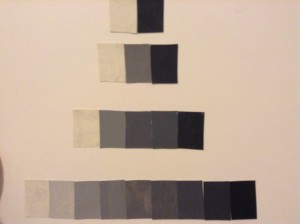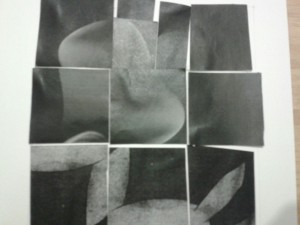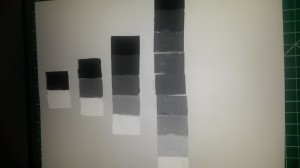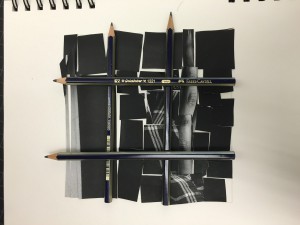This took m about 3 hours to finish, but im satisfied with how it came out. Due to my crappy quality brushes, some of the strokes came out a bit shakey, but at least it kept its shade. The white got a bit dirty when i was pasting it on the bristol, but overall, i would say it came out well. For 3 hours, i’m satisfied with the final product.
Monthly Archives: October 2014
Project #3: Collages
Here are my collages for Project #3
For the first One, i was making my focus the bell shaped figure, surrounded by a dark frame (disregard the gloss around it, the lighting was not the best in the pictures). As for the second one, i went for variety, although it feels a bit lopsided, but i wanna see what others think i should do before i make major changes to it. does it need more or lesss? I would appriciate some feedback.
Gouache painted grayscale
Project 2: Reflection
In Project 2 Of English 1101 we had to take a 10-15 minute walk passed city tech. Our goal was to use our senses and observe an overlapping New York. We would post about the location we chose and why did we choose it. Prior to the project we read ” City Limits” by Colson Whitehead and got an idea on how to explain our topics in our writing.One of the goals was to compare and contrast Different and overlapping New Yorks and the people that live there and how they are affected by it. I wrote about the overlap between commercial buildings and personals stores like Groceries or even little apartments far off next to the Brooklyn Bridge. I thoroughly enjoyed getting to know this area more and the type of people who live here. I am new to the busy side of Brooklyn so this project made me feel more welcomed around here.Because I got more familiar, I was enlightened. I was Taught where the nearest Barnes and Noble is located and I learned directions towards different subway stations to lead me to City Tech just in case I am stuck In Traffic, However I think I need more improvement on how I describe my surroundings and senses.But since I have acquired these life skills , I know I have gained something from this adventurous project. The additional support I had was friends and I going through the busy streets and spotting anything of interest to help us along the project and also the reading of City Limits and how a overlapping New York look like.
Summary of the reading, “A Literary Visitor Strolls in From the Airport”
In this New York Times article by Charles McGrath, he discusses about a tall, longed haired, and usual author named, Will Self, that only walks to place to place. Mr. Self lived in London but he had to travel to New York. He didn’t take any transportation to get to the airport, but walked there. To think how he has the ability and time to so much walking in one day. In the past, Mr. Self was struggling with drug and alcohol addiction. It was affecting his career and life, so, he turned to the path of becoming clean for eight years. He rebuilt his energy by taking extreme hikes and walks and it helped him stay away from the addictions. While he was visiting New York, he came across many things in the city and seen things that even New Yorker didn’t notice or acknowledge. This man didn’t like to be sociable or happy in the past when his demons were holding him down, but eight years later, Mr. Self changed into a new and inspiring man that walks anywhere and enjoy anything he sees.
In-Class Progress on Collage
Glossary Entry – From “City Limits”
Drab
Definition- (noun) a dull, lifeless, or faded appearance or quality
Source: http://www.merriam-webster.com/dictionary/drab
I came across this word in the last line of the first paragraph of the reading.
As i reread the sentence that the word is located, I sort of guessed what it probably meant. But now that i understand what it really means, i can use this word in my vocabulary and in my other projects/essays.
Resoled
Def: (prefix) again, anew
Source: http://www.merriam-webster.com/dictionary/resoled
I found this word in the middle of the second paragraph.
When i first saw this word, i was thinking about shoes. Like the soles of the shoes. (i hope i spelled that right) Anyway, i went to reread the sentence and looked up the word, it made more sense to me.
Palsied
Def: (adjective)affect with
Source: http://www.merriam-webster.com/dictionary/palsied?show=0&t=1414006036
Found the word in the 4th paragraph.
This word confused me more as i tried to reread the sentence, but i knew what it meant when i look it up. I’ll have to keep finding the perfect definition to help me understand it more clearly.
Hokum
Def: (noun)foolish, or untrue words or ideas; Nonsense, unrealistic situations
Sources: http://www.merriam-webster.com/dictionary/hokum ,and
From Prof. Rosen as we went over the reading together
Found this word near the beginning in the 6th paragraph.
Honestly, I guess that it meant nonsense because of the short sentence and the other sentences after made sense to me. It’s just a “fancy” way of saying that is all untrue. Might as well use this in my vocabulary.
Unheralded (opposite of the word : herald)
Def: (adjective)without warning; not previously announced, expected or recognized
Sources: From Prof. Rosen in-class, and
https://www.google.com/webhp?sourceid=chrome-instant&ion=1&espv=2&ie=UTF-8#q=unheralded
Found this word the middle of the 10th paragraph.
This was new to me like any other words i found in this reading, but this one had a clear meaning to it that even helped me to use it in my Project#2 essay. I sort of understood it when Pro. Rosen explained it in class and as i found the definition online.
Impediments
Def: (noun)Road block; a hindrance or obstruction in doing something.
Sources: From Pro. Rosen, and https://www.google.com/webhp?sourceid=chrome-instant&ion=1&espv=2&ie=UTF-8#q=impediments
Found this in the middle of the 11th paragraph
This word was familiar to me because i’ve seen this in previous readings/books in my life and i’ve been using it mostly. Also, as you reread the sentence , you can understand the word without looking up the true meaning.
Incredulous
Def: (adjective) not able or willing to believe something : feeling or showing a lack of belief
Source: http://www.merriam-webster.com/dictionary/incredulous
Found this in the 11th paragraph.
I didn’t understand this word at all as i read the sentence over and over.But when i finally gave in and looked it up, i totally understand now.
Article Summary
Title: “A literary visitor strolls in from the airport”, article by Charles McGrath
This passage entails a story about a Mr. Self, A cab driver from London who comes to New York for the first time on December 6, 2006. The text captures the idea that walking throughout the city is not a common today as it used to be many years ago. It reveals Mr. Self’s past as a heavy alcoholic and and a serious drug addict. It also shows how he managed to put that aside by beginning walking as a replacement or a form of coping. McGrath shows how walking through the city of New york caused Mr. Self to be able to see aspects of the land that many others have not discovered because they drive rather than walk. He even says, “People don’t know where they are anymore” with a tone of slight frustration because walking through an are is the only way left for a person to explore. It also connects to Colson Whitehead’s “City limits” with the concept of overlapping cities when Mr. Self points out the interface of a black and Hispanic neighborhood to an Orthodox Jewish area.Most individuals may not even notice that such an overlap exist because no one thinks of walking along highways, or even walking to the heart of the city all the way from an airport.
Melancholy
Source- Merriam-Webster.com
Melancholy- a sad mood or feeling
I came across this vocabulary word in the article ” A literary visitor strolls from the airport”. It states, “.. Mr. Self, who is unusually tall and very thin and has a long melancholy face that he once described as looking like a bag of genitals…..” From the text it came from, I determined that it isn’t a positive word that people may use often to describe an individual. Once I found the meaning of the world, I was able to picture the typical expression that Mr. Self may always have on. With this in mind, the actions that he takes on further in the passage makes more sense because I have more of an understanding of who this man is.
Annotating a reading/ reviewing for the midterm
What do we do when we read with a pen (or pencil, or highlighter) in hand?
vocabulary/cultural references–words to look up: underline, use context and then look up later. After: write them in the margins, or on the back, or on a separate sheet.
highlighted, underlined sentences that worked together to establish the article’s argument
think about color-coding the text
things that repeated–note page or paragraph #
short summaries of important paragraphs
connect ideas to other things you read/experienced
ask questions: for clarification or to engage with the author/speaker
tone: sarcasm, joking
note the things you know well, have expertise
main idea: or example that explains the main idea
passages you might want to quote when you write about this article
drawing–sketch an idea
drawing arrows, circles
number code for different ideas eg 1=walking 2=exploring life 3=landmarks
bullet points about the different people or places
tagging
reading more than once
identify arguments/main points:
- walking vs drug addiction: helps him keep his mind off drugs, coping,
- his experience of NYC vs other people’s experience
- walking lets you discover, pay attention (buildings, parks), but if you’re driving, you miss all of these things. EXPLORATION, physically and visually/intellectually rewarding
anticipate questions:
- Consider your preferred form of travel compared to Self’s idea of walking as the only way of exploration
- think about a time when you developed a healthy habit. How does this relate to Self’s idea of walking instead of taking drugs?
- What emotions do you experience when walking? How does walking affect your point of view?
- How does walking give you a different/better experience than other forms of transportation
- views on NY–exploration
- views of perseverance/persistence
Organizing your in-class essay:
make an outline/organizational representation of your ideas
focused freewrite
bring in examples from the reading–
draft a THESIS STATEMENT
- main argument or point of your essay
- it’s a roadmap to your essay
- it isn’t a question, it’s the answer–it’s a statement!
- when you’re writing about a comparison, a good template for your thesis statement is to show how two things that seem different are actually similar, or two things that seem similar are actually different, or some combination of these. Try “Although my healthy habits involved going to the gym rather than taking long walks like Self did, we both had the opportunity to explore places where people from different backgrounds come together.” I’d expect that the essay would describe your experience of making healthy choices by going to the gym, and maybe in another paragraph how it exposed you to different people from different backgrounds, all coming together in one place. Then you would do the same for Self’s experience, and then offer a comparison. Your outline is right there in the thesis statement!
- it comes at the end of your introductory paragraph.
(leave space after the first paragraph to be able to come back and revise)
write the essay!
make sure that your essay fits with 1-the question 2-the thesis statement
at the very end, proofread a few times. Here are a few tips:
- before the exam, check out the list of Frequently Confused Words (and add to it via the comments) to help you prepare for the midterm
- You might try reading your essay sentence-by-sentence starting with the last one and moving backward to the beginning–it helps you read out of context, so you pay better attention to the construction of the sentence.
- Read through looking for one thing at a time: first if you’re following all of the instructions/answering the question, then if you’re supporting your thesis statement, then if you have good organization, sentence structure, use the right words, spell them properly, etc. You can see that my list starts with the most important and moves to the less important.







